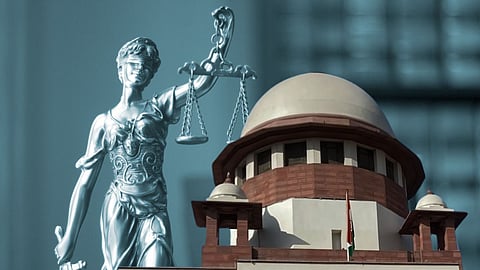

THE SUPREME COURT ON TUESDAY once again voiced its concern stating whether it was to adopt a hands off position if Bills are languishing for a long time with the Governor or the President for assent. Earlier the Court had pointed out that if the Governor, in exercise of his powers under Article 200 of the Constitution, withholds his assent without taking recourse to returning it to the State assembly with a message, or reserving it for consideration by the President, the bill would perish.
The top Court expressed its concern as senior advocate Harish Salve, representing the Maharashtra government, told a five-judge Constitution Bench headed by Chief Justice B.R. Gavai that the Union government can block any Bill passed by the State legislature, and the Supreme Court cannot question the Governor or the President as to why the Bill presented for assent was not being acted upon.
Salve argued:
“The Governor is beyond the pale of judicial reviews. Governor cannot be asked’ why he did what he did’ and ‘no mandamus can be issued to him’. The Court can only ask what he did and not why he did.”
Salve backed his position that the Union government can stall any Bill passed by the State legislature and the action or inaction of the Governor, after being presented with the Bill, cannot be gone into by the Court, stating that unlike USA and other countries, federalism under the Indian constitution was “limited”.
Terming as “uncharitable” the use of the word “veto” for the Governor’s decision to withhold the Bill, and noting that the court has no footprints in such a situation, Salve proposed that the impasse can be resolved through the political process of consultation and building consensus.
Apparently not convinced by the position articulated by Salve, of insulating the Governor’s actions in exercise of Article 200 from judicial scrutiny, Chief Justice Gavai asked him about the sanctity of the Union List, State List, and the Concurrent List under the Seventh Schedule of the Constitution.
Salve also referred to the concluding address of Dr. Bhim Rao Ambedkar at the Constituent Assembly, where Ambedkar had said that while the Union government/State governments would work within the spheres allotted to them, the Union would have an overarching power in case of an emergency.
Making a distinction between the position of the President and the Governor – a nominee of the President, Salve argued that the President is bound by the aid and advice of the Union Council of Ministers, whereas it was not so in the case of the Governor.
When Salve argued that the use of word “may” instead of “shall: Article 200 reflected the independent powers of the Governor, Justice Narasimha referred referring to the arguments advanced by the Solicitor General Tushar Mehta and observed that in that case the Governor could withhold assent to even Money Bill at the threshold itself.
Justice Narasimha remarked that if a Governor at the threshold can withhold a bill, he can then even withhold a money bill. Salve, without discounting such a possibility, assured that it would not happen as the Money Bill is presented before the State Assembly upon being forwarded by the Governor himself.But if there are changes in the Money Bill in the course of its passing, the Governor can withhold his hand.
Background
The Constitution Bench of the Supreme Court is hearing the Presidential Reference regarding the power of the judiciary to prescribe timelines for the President and Governors while dealing with Bills passed by State legislatures.
The Presidential Reference, made on May 15, 2025, questions whether the Court exceeded its jurisdiction by prescribing timelines for the President and Governors to act on State Bills, as well as whether the concept of “deemed assent” violates the doctrine of separation of powers. The Union government has defended the Reference, stating that the judiciary’s intervention encroached upon constitutional functions of the executive.
The States of Tamil Nadu and Kerala have questioned the maintainability of the Presidential Reference contending that it violates the boundaries of Article 143 of the Constitution, which governs the advisory jurisdiction of the Supreme Court. Kerala government has argued that such a Reference can only be made if the legal question is still undecided or res integra. It has said that constitutional questions raised in the present Reference—relating to the powers of the President and Governors under Articles 200 and 201—have already been settled by the Court.